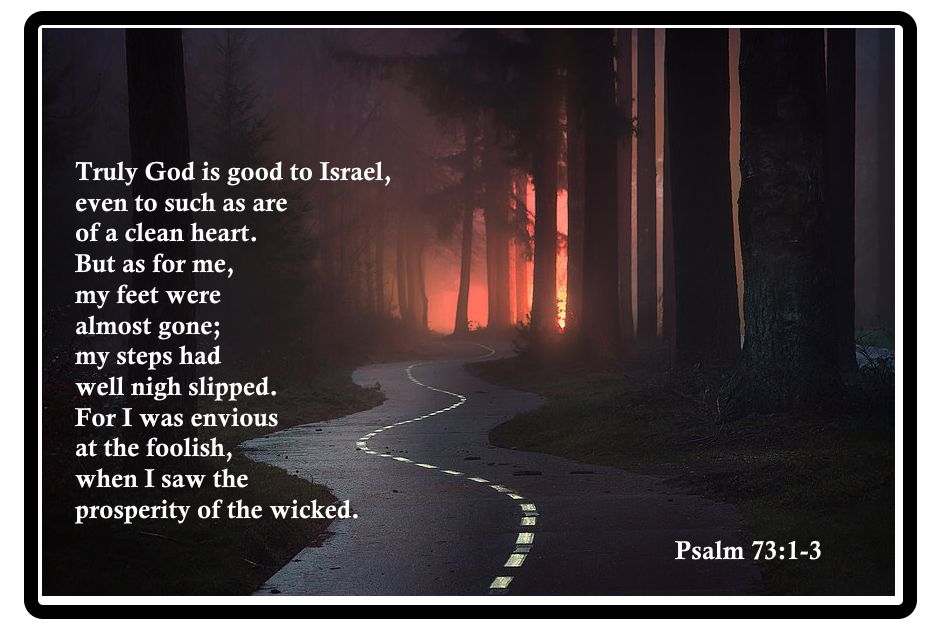A Believer With Questions – Psalms 73:1-3
Asaph begins with a strong statement of faith. He is not doubting God’s existence or His goodness, but he is having doubts about God’s administration of justice. First notice his statement of faith.
Psalms 73:1 Truly God is good to Israel, even to such as are of a clean heart. There is no doubt here. Asaph declares with full assurance and faith, “Surely, absolutely, God is good to Israel, to his covenanted people, his chosen nation.”
Asaph further qualifies that statement because not all of the people within the nation of Israel would be blessed by God, so he adds, “even to such as are of a clean heart.” The idea of a clean heart is one that is pure in its purpose of obeying and following the Lord. It doesn’t mean sinless or never having doubts. Later in this very Psalms Asaph is going to confess to both those things.
Jesus may have been thinking of this verse or many others like it when he was preaching the sermon on the Mount, Matthew 5:8 Blessed are the pure in heart: for they shall see God. This is where the true follower of God turns his eyes, his life and his purpose toward God and Jesus said that would be their reward.
So far so good, Asaph. God is good toward his people, those who live righteously and seek Him. Asaph wants it understood, “I know this is true. I have no doubts about God and his goodness, his love, his mercy or his grace.”
That would have been a pretty short Psalms if he had stopped there. But he didn’t because the theme of the Psalms isn’t God’s goodness, it is God’s dealings with wickedness. Its about God, Good, Evil and Me. (that would make a good title for a sermon, I think.)
Now look at Psalms 73:2-3 But as for me, my feet were almost gone; my steps had well nigh slipped. 3 For I was envious at the foolish, when I saw the prosperity (Hebrew: the shalom) of the wicked.
Asaph expresses a real danger personal danger. My feet were almost gone, I was close to falling. His feet, which had stood upon such solid ground in vs. 1, now were in danger of slipping because he couldn’t understand why the wicked had prosperity, peace, seemingly blessings. He was having a hard time trying to walk on the righteous path. Why, he asks, does the holy God, who hates sin, let those who pursue it the most flourish? Why does He let His own people suffer in contrast to the wicked who prosper?
Asaph’s is asking a legitimate but dangerous question.
If Asaph’s questions and doubts haven’t occurred to you, then you probably haven’t been around very long. We face this question as soon as we step out into the wide world. From grade school though the rest of our life, we can see what Asaph saw and if we are honest, we will ask the same question.
“Why does that little girl in Kindergarten get away with knocking down my blocks and stealing them for her tower?” Later on, we ask, “Lord, why do you allow arrogant, evil, wicked, corrupt people to prosper as entertainers, athletes, businesspeople, politicians, internet moguls and so many other high places in society?” That little girl in kindergarten who stole your blocks is probably now in Washington DC getting inside stock tips and take bribes from lobbyists. Maybe not, but you get the idea.
The wider and deeper you look at the world, the more wicked and despicable are the people who are running it. Like Job, Elijah, Jeremiah or Ezekiel, Asaph is struggling with this issue. He is being honest with God and through God’s word, honest with us even today. When you think about that it makes the Bible a little dangerous, doesn’t it?
If we try and deal with this problem from our own perspective, we wind up in the situation our nation is in today. Trying to equate or equalize all disparities of justice, wealth and privilege and making the situation so much worse than it was. Movements like LGBTQ, DEI, ESG, phrases like “being woke” or what a SJW does are all attempts by man without God to try and fix the problem Asaph is talking about. (If you don’t know what all those acronyms mean, you’re probably better off than I am and I’m not going to use precious time in the pulpit to define them)
But I will say this, those movements and the social justice warriors who try and ram them down our throats, don’t see God, goodness, or evil as Asaph did. They see the problem but not from Asaph’s beginning solid ground. Asaph had an anchor in his faith, but this present society is adrift in a sea of anarchy with no chart, compass or anchor. Trying to fix the world’s wickedness or your own wickedness while swimming in that wickedness is like trying to throw out an anchor with the rope tied round your neck. The result, because it lacks the solid standing of faith in God, is why our society and lives are so divided, broken, bitter and hopeless today. Seeing the problem but lacking the proper perspective can only destroy not restore.
